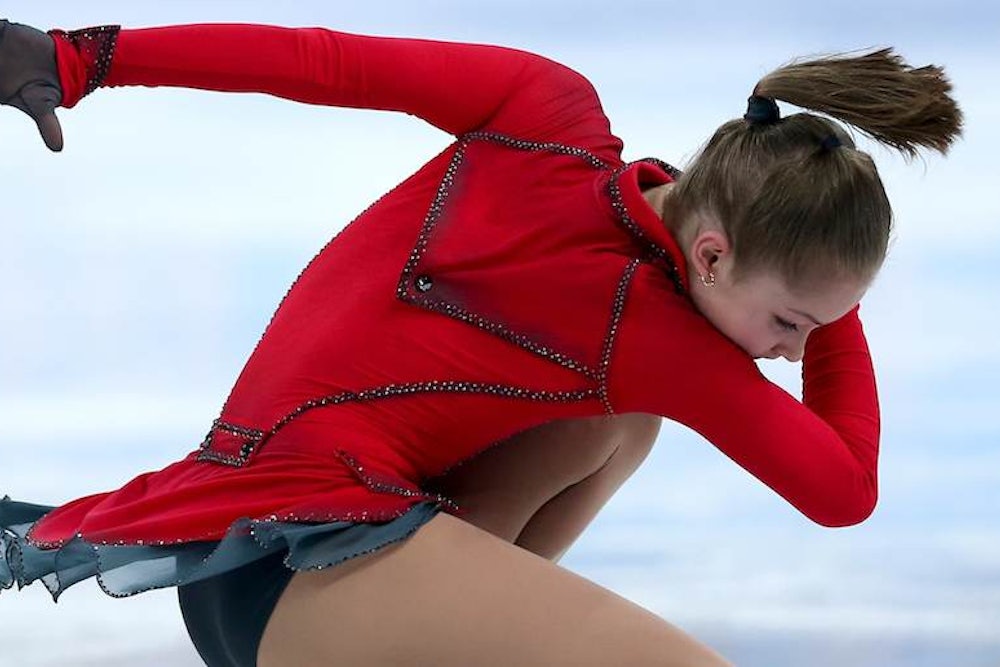Last night, Russian figure skater Yulia Lipnitskaya helped the Russians snag their first gold medal in these Olympic games. She skated flawlessly and gracefully, but watching her skate, I couldn't help thinking of the monikers she usually gets in the press—"prodigy," "wunderkind"—because these are words that, usually, etymologically, refer to children. And, despite her obvious, prodigious talent, Lipnitskaya is a child.
Lipnitskaya was born on June 5, 1998—a year I'm pretty sure even my baby sister has crystalline memories of—and she qualified for the Olympics with less than a month to spare: to make the cut, you have to turn 15 by July 1st of the year before the Olympics start, which Yulia hit in June, 2013. Now that she's broken a record, her age is quantified not just in years but in days: 15 years and 249 days. That's just six days fewer than the similarly-named Tara Lipinski had to her name when she set the old record in Nagano in—wait for it—1998. It's almost reminiscent of the way children calculate their ages. Time goes slower for them and age enforces a hierarchy, so every month, every day counts.
Today, VKontakte, Russia's version of Facebook, confirmed the authenticity of an account that had for days been attributed to Lipnitskaya. Take one look at it and contrast it with the thing she's accomplished, and you feel like you're looking at a Lolita, a girl whose user pic is of a white teddy bear in a red shirt but who runs with the adults. She gives interviews like a real, sardonic Russian adult—asked if it was the best routine of the season, she responded, "that's just the score"—but on her VKontakte page, she writes: "I want...many, many balloons!" Many Russian kids who train in sports or ballet from young age don't really have a childhood as we think of it, but the juxtaposition here is quite jarring.
Jarring too is seeing Lipnitskaya with her teammates. Commentators warbled about how light she is on her skates, but, to my eye, the lightness looked odd. Wiry and flat-chested, she looks pubescent on the ice, and the adult women skaters look huge and bulky by comparison. In part, this is because the spread between her and the oldest teammate, Evgeni Plushenko, is 16 years—that is, more years than Lipnitskaya has spent on the planet. She licked the adults, sure, but her presence is distorting, like the high schoolers came to play in the sandbox, or the third-grader showed up at high school prom.
Look, for example, at the difference in how Putin congratulated the members of the Russian figure skating team, and how he congratulated Lipnitskaya. Joining them ringside, Putin kissed all the female skaters on the cheek and shook hands with the men. When he got to Lipnistkaya, though, Putin, whose face has been frozen in an aloof, Botox cool for all of the Games so far, melted. "Great job," he told her, pinching her cheek. "Very beautiful." He congratulated someone else, then came back to her and ruffled her hair, beaming at her like he would at his granddaughter.
Lipnitskaya may have drubbed the adults fair and square, and it was all perfectly legal, but it just felt wrong somehow. Perhaps the minimum age for the Olympics should be 18, not 15. Maybe then it'll feel a little more like a real, adult competition.
New Republic Senior Editor Julia Ioffe will be writing dispatches from Russia for the duration of the Olympics. For the entire collection of her pieces, click here.
